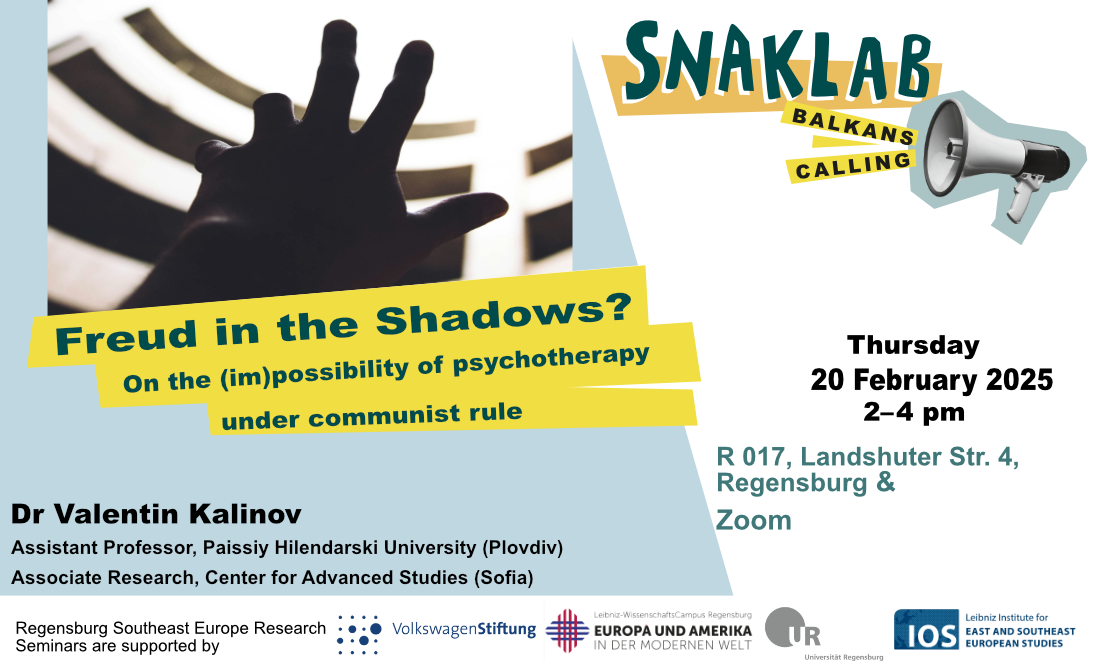
- This event has passed.
SNAKLAB Regensburg Southeastern Europe Research Seminars

Dr Valentin Kalinov (University of Plovdiv) will give a talk on…
“Freud in the Shadows? On the (im)possibility of psychotherapy under communist rule“
Time: 2-4 pm
Venue: IOS, R017
via Zoom: https://uni-regensburg.zoom-x.de/j/66040879796
Abstract:
Is there a place for psychoanalysis and psychotherapy in the totalitarian discourse on mental health? The negative answer to this question might seem self-evident. However, as in other humanities fields of socialist knowledge – such as academic philosophy, history, literature, and the arts – a critical look can delineate places of disobedience, deviations from the officially sanctioned perspectives, and even deliberate subversions of the imposed ideological discourse.
These are places – in thought, writing and public speaking – that function as symptoms. In these shadowy places, under the watchful eye of the Party’s guardians, a singular social fact and an existential meaning are produced, marked simultaneously by the forces of repression and resistance to repression.
This lecture seeks to explore three avenues of inquiry: 1) Mapping Symptomatic Places and their immanent practices of knowledge production; 2) “Life in Truth” as a practice in the field of psychotherapy and psychoanalysis; 3) The Disruptive Potential of Psychoanalysis.
The first objective is to outline the typology of these places-symptoms that constitute the (im)possibility of psychotherapy during Bulgaria’s totalitarian regime in the second half of the twentieth century. This examination will take a broad perspective, analyzing ideological recognition and misrecognition of Marx and Freud, state Marxism-Leninism and psychoanalysis, discourse and counter-discourse. To this end, I will investigate the forms of domestication and “Sovietization” of psychoanalytic conceptual and technical apparatus.
The second aim is to shed light on some particular modalities of “life-in-truth” and “life-in-lie” practiced within these symptomatic places, which, for various reasons, have so far remained on the margins of memory and history.
Thirdly, the lecture will highlight the critical and destructive power of psychoanalysis and psychotherapy in the context of the ideological construction of a ‘socialist way of life’ and a ‘communist intimacy’ during the period of so-called mature socialism.
These three lines of thought would contribute to a fuller understanding of the stakes of the past under conditions of totalitarian repression, as well as the anxieties of the future. Both, however, remain linked to the “hope of truth” – the only force that can give life the power to survive.
The methodology of this lecture integrates archival research with critical engagement in philosophical and psychoanalytic literature. By examining overlooked or marginalized sources, the talk seeks to uncover the untold story of psychoanalysis under totalitarian rule in Bulgaria, bringing it into dialogue with broader intellectual frameworks, including Marxist ideology, psychoanalytic theory, and philosophy. This interdisciplinary approach not only reconstructs a neglected historical narrative but also situates it within larger debates on the tensions between repression and resistance, ideology and counter-discourse. The academic aim is twofold: to illuminate the specific historical dynamics of psychoanalysis within this context and to contribute to broader scholarly discussions on the intersections of psychoanalysis, philosophy, and political ideology.